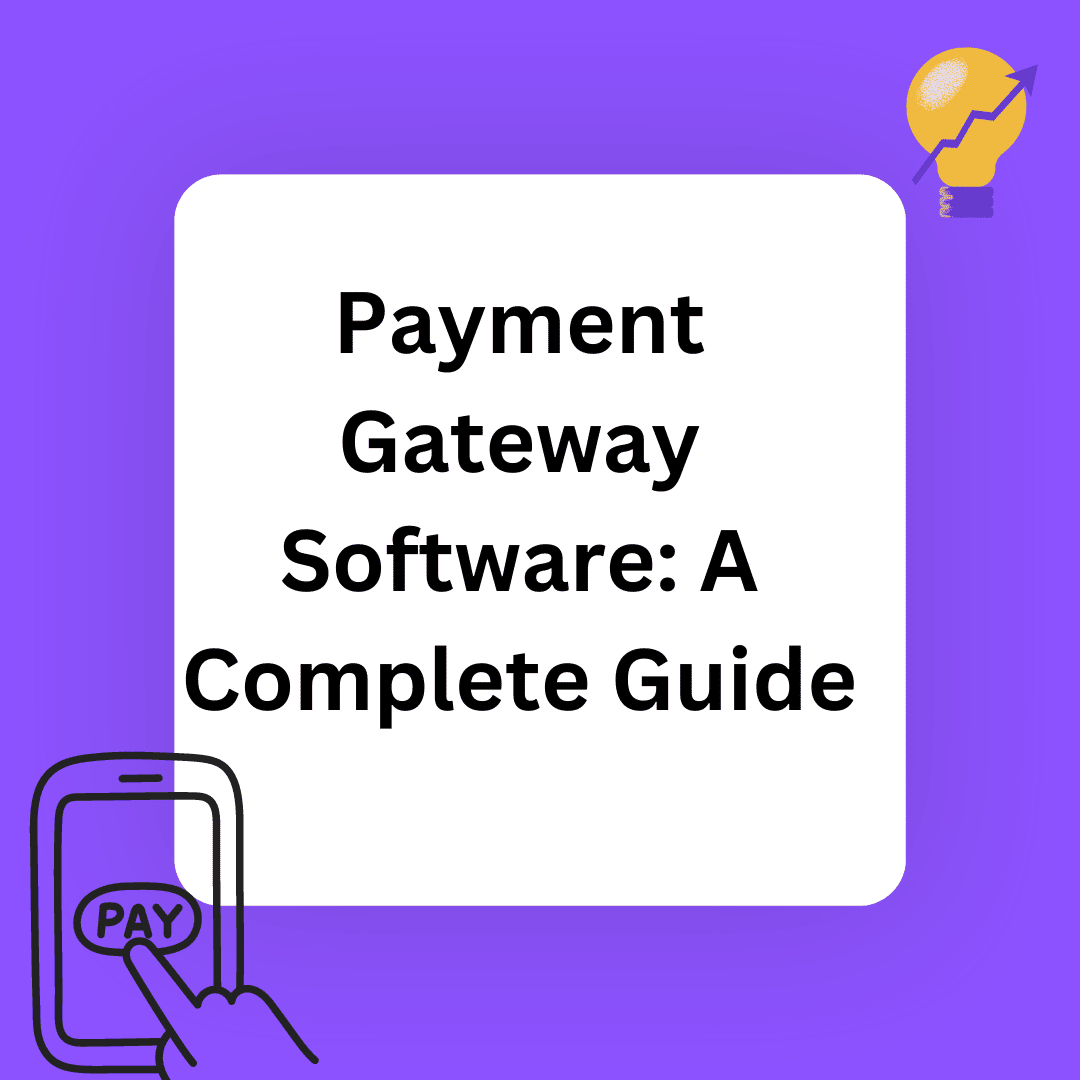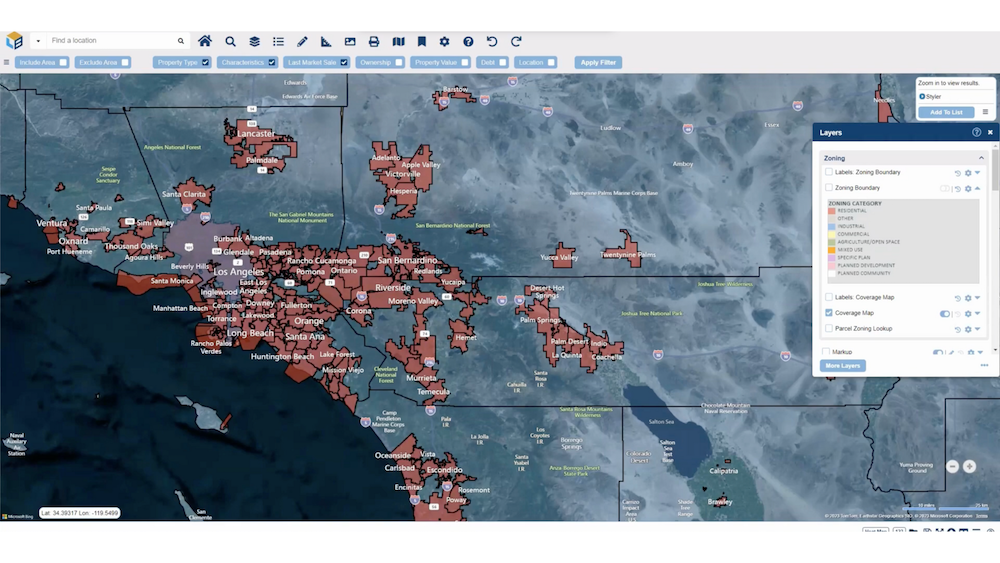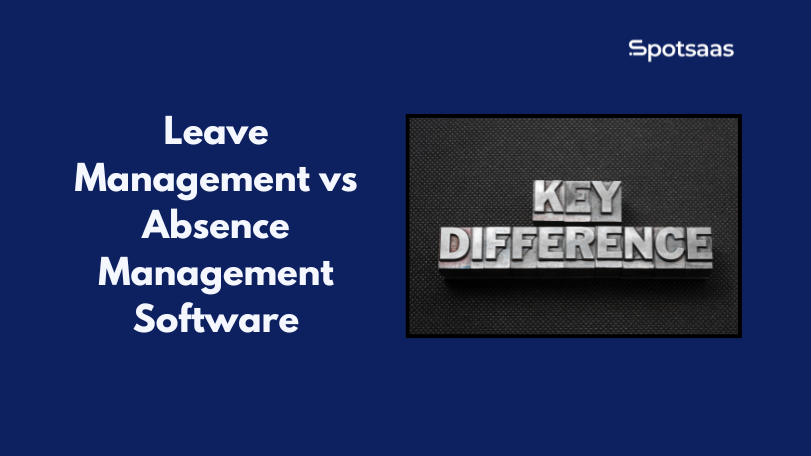🚨 Why This Blog Matters
Choosing the right absence management software is critical for avoiding scheduling conflicts, improving employee experience, and ensuring compliance. This guide compares BambooHR vs Workday to help HR teams make a confident, ROI-driven software decision.
🧠 What You’ll Learn Here
Explore a side-by-side breakdown of BambooHR and Workday, covering key areas like ease of setup, PTO tracking, workflow automation, integration scope, and pricing. You’ll learn which platform fits better for SMBs vs enterprises, and when to prioritize simplicity over scalability.
🎯 Who Should Read This
Perfect for HR professionals, operations managers, and tech evaluators comparing HR systems. If you’re deciding between plug-and-play HR software like BambooHR or a fully integrated enterprise suite like Workday, this guide will clarify which one suits your team’s size, structure, and goals.
Choosing the right absence management software can directly impact how smoothly a team functions, especially when time-off requests, approvals, and scheduling overlap. Two popular platforms in this space are BambooHR and Workday.
BambooHR is widely known among small and mid-sized businesses for its clean interface and intuitive HR tools, including time-off tracking and self-serve features for employees. On the other side, Workday serves larger enterprises with a full suite of HR and finance tools, offering deeper customization for complex scheduling, compliance, and workforce planning.
This comparison walks through how both platforms handle absence management and helps teams understand which one fits best based on size, budget, and internal processes. Whether you’re looking to simplify basic PTO tracking or manage global teams with layered approval workflows, this breakdown will give you the clarity you need before moving forward.
Comparison Methodology: How We Evaluated BambooHR vs Workday
This comparison guide breaks down the key differences between BambooHR and Workday to help you choose the right absence management software for your team. Here’s what you’ll find:
- A quick overview of both platforms and their core strengths
- A detailed feature-by-feature comparison
- Key differences explained in plain terms
- Use cases for small teams vs large enterprises
- Pros and cons of each solution
- Pricing breakdown and how each model works
- Integration and support insights
- Final verdict with clear recommendations
Whether you’re managing a growing startup or a large workforce across locations, this guide will help you make an informed decision.
Feature Comparison Table: BambooHR vs Workday for Absence Management
According to SpotSaaS, BambooHR is a top choice for small to mid-sized businesses that want fast, self-serve leave management with minimal setup. Workday, on the other hand, is built for large enterprises with complex leave policies, compliance requirements, and cross-department workflows.
| Feature | BambooHR | Workday |
|---|---|---|
| Time-Off Management | ✔️ Easy self-service portal | ✔️ Advanced policy automation |
| PTO Approvals & Workflows | ✔️ Custom workflows for managers | ✔️ Complex workflow support |
| Calendar Integration | ✔️ Google & Outlook sync | ✔️ Enterprise calendar sync |
| Mobile Access | ✔️ iOS & Android app | ✔️ Advanced mobile features |
| Reporting & Analytics | ➖ Basic leave reports | ✔️ Detailed absence trend reports |
| Ideal For | SMBs, Startups | Mid-size to Large Enterprises |
| Starting Price | Starts at $6.19/user/month* | Custom quote only |
| Free Trial | ✅ Available | ❌ Not offered |
Key Differences Between BambooHR and Workday Absence Management Tools

Ease of Setup: BambooHR vs Workday Implementation Time
If your team is looking for a solution that doesn’t take weeks to implement, BambooHR delivers. It’s built with simplicity at its core, which means HR managers can set up leave policies, invite employees, and begin tracking absences within a short time. There’s no need for IT involvement or deep technical knowledge to get started. This makes it especially useful for small businesses or growing teams that don’t have a dedicated HR tech department.
In contrast, Workday often requires a more structured rollout. Because it’s part of a larger suite of enterprise tools, setup usually involves multiple stakeholders, training sessions, and data migration planning. For organizations with complex HR systems already in place, this effort can be worthwhile, but it may not suit teams looking for a lightweight or plug-and-play option.
Feature Depth: Time-Off Tracking, Policies, and Customization
Workday goes far beyond basic time-off tracking. It supports layered leave policies, global compliance rules, workforce planning, and advanced analytics. The platform is built to serve organizations where HR isn’t just an admin function, but a strategic one. If your team operates across regions or needs to manage different leave entitlements, Workday can adapt to those needs with precision.
On the other hand, BambooHR focuses on streamlining the essentials. Its absence management module includes PTO balances, custom leave types, approval workflows, and calendar syncing—all packaged in a clean, intuitive layout. It may not match Workday’s depth, but it excels in offering what most small and medium-sized businesses actually need.
Trial Access and Free Trial Options for BambooHR and Workday
Trying a platform before you commit is often a key factor when choosing software. BambooHR makes this easy by offering a clear path to a free trial. This allows HR teams to explore the interface, test workflows, and see if the solution fits their current needs.
Workday typically doesn’t offer a self-serve trial. The process usually starts with a demo or discovery call, followed by tailored recommendations. This approach suits enterprises evaluating Workday as part of a broader transformation strategy, but may be less ideal for smaller teams looking for a fast, hands-on evaluation.
Integration Capabilities: HR, Payroll, and Scheduling Tools
Integration is another key area where these platforms differ. Workday is built as a fully integrated system that connects HR, finance, talent management, and compliance. For large businesses, this means fewer data silos and more efficient workflows across departments. For example, an employee’s leave records can directly impact payroll, scheduling, and budgeting—all within the same system.
BambooHR offers integrations, too, but its focus is tighter. It connects with payroll tools, scheduling apps, and calendar systems commonly used by SMBs. These integrations help reduce manual work while keeping the platform simple and user-friendly. If your team doesn’t require a deeply embedded HR-tech ecosystem, BambooHR covers the basics well.
Best Fit by Business Size: BambooHR for SMBs vs Workday for Enterprises
Your team size and internal processes play a big role in choosing absence management tools. BambooHR is a favorite among startups, remote-first teams, and small businesses that need efficient HR tools without the overhead of managing a full enterprise suite. It offers a modern experience with quick setup and solid support.
Workday, by contrast, is purpose-built for organizations with complex HR structures, global teams, and advanced compliance requirements. It’s an investment in scalability and structure, making it a good choice for companies with formal HR departments and a need for centralized control.
Who Should Use BambooHR for Absence Management?
🏢 Best for Small Teams
Perfect for startups and teams under 500 employees looking for quick, simple absence tracking.
👥 Easy for Lean HR
No IT or training needed. HR teams can launch BambooHR with minimal setup and effort.
📲 Self-Service for Staff
Employees can check balances, request leave, and get approvals—all from desktop or mobile.
⚡ Fast & Affordable
Setup takes days, not weeks. Pricing fits small budgets with essentials included from day one.
Why BambooHR Is Ideal for Small to Mid-Sized Businesses
BambooHR is built for businesses that want a smart, efficient way to manage employee time-off without dealing with complex software. It’s a strong fit for startups, small offices, and companies with fewer than 500 employees who need practical features without the cost or overhead of enterprise platforms.
BambooHR for Lean HR Teams and Non-Technical Setups
If your HR team is small—or if HR duties are shared across departments—BambooHR offers a clean and simple interface that anyone can use. It doesn’t require technical expertise or long onboarding sessions to get up and running.
Self-Service Features for Employees Using BambooHR
BambooHR puts control in the hands of employees. With a mobile-friendly dashboard, team members can check their PTO balance, request leave, and see approvals in real time. Managers can respond to requests quickly, which helps avoid scheduling gaps or delays.
Fast Implementation Timeline for BambooHR
Most teams can set up BambooHR in just a few days. The platform includes pre-built templates, approval workflows, and calendar syncing out of the box. This speed makes it ideal for companies that want to improve absence tracking without waiting through a long rollout phase.
BambooHR Pricing: A Budget-Friendly Option for Growing Teams
BambooHR starts at a competitive per-user rate, making it accessible to smaller teams looking for value without sacrificing quality. It includes essentials like time-off tracking, employee profiles, and reporting at a price point designed for growth.
Who Should Use Workday for Absence and Workforce Management?
🏢 Built for Scale
Ideal for enterprise teams with complex structures across locations, departments, or legal entities.
⚙️ Custom Workflows
Supports advanced PTO rules, layered approvals, and region-specific compliance policies.
📊 Smart Analytics
Turn time-off data into workforce insights with powerful reporting tools and trend analysis.
🔗 Full-System Integration
Connect absence tracking with payroll, finance, and operations for a unified HR experience.
Why Workday Works Best for Large Enterprises
Workday is designed to meet the needs of mid-sized to enterprise-level businesses. If your company operates across multiple departments, regions, or legal entities, Workday offers the structure and flexibility to handle absence tracking at scale. It’s best suited for HR teams that need more than just leave approvals—think compliance, planning, and in-depth analytics.
Custom Leave Policies and Approval Workflows in Workday
One of Workday’s strongest points is its ability to adapt to complex policies. Whether you have varied PTO structures by location, industry-specific compliance needs, or layered approval rules, Workday can support them. It allows HR teams to create automated workflows that reflect real-world processes across teams, regions, or business units.
Workday Reporting and Insights for Enterprise HR Teams
Workday offers advanced analytics that go beyond basic reports. It helps leadership and HR professionals spot trends, understand time-off impacts on productivity, and track compliance across global teams. If your team relies on data to make workforce decisions, Workday’s analytics can provide a deeper view into your organization.
Workday Integrations: Connecting HR, Payroll, and Finance
Workday is more than absence management. It’s part of a broader ecosystem that includes payroll, finance, talent management, and operations. For companies looking for a unified system that links time-off tracking to payroll, budgets, and staffing plans, Workday provides strong integration across departments.
Workday Support and Scalability for Global Operations
With Workday, implementation is often guided by experts, and support typically includes personalized onboarding and dedicated account management. This makes it a suitable choice for teams looking for a long-term partner that can evolve with their workforce needs.
| ✅ Pros | ❌ Cons |
|---|---|
| BambooHR | |
| Simple UI and fast setup | Limited advanced reporting |
| Budget-friendly | Not ideal for complex org structures |
| Free trial available | Some features require higher-tier plans |
| Workday | |
| Built for enterprise scale | Requires custom pricing |
| Rich in analytics and workflows | Longer setup and learning curve |
| Compliance-focused tools | No free trial or pricing transparency |
What’s the pricing difference between BambooHR and Workday?
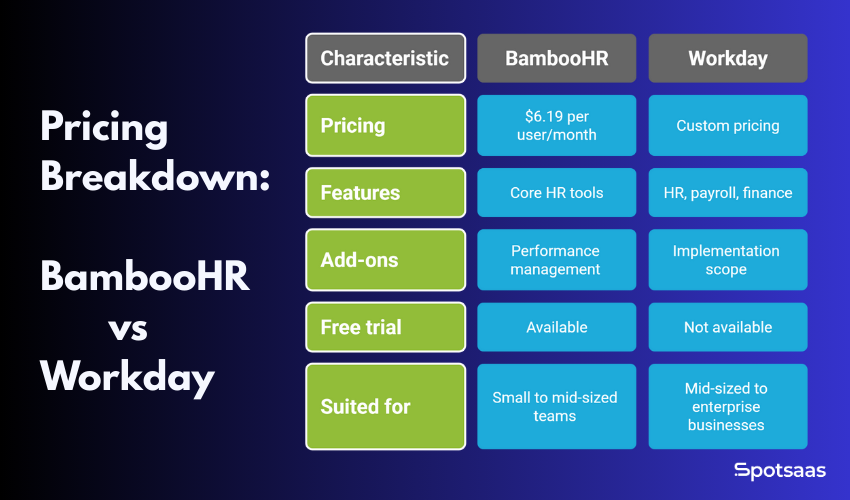
BambooHR Pricing Overview: Transparent and Scalable Plans
BambooHR pricing uses a straightforward, per-user pricing model. It’s ideal for small to mid-sized teams that want core HR tools without overcommitting to features they may not need right away.
- Starts at approximately $6.19 per user/month
- Features like time-off tracking, employee records, and a self-service portal are included in the core plan.
- Add-ons such as performance management or advanced analytics are available as your needs grow.
- A free trial is available, allowing teams to explore features before purchasing.
- Suitable for teams that want flexibility and room to scale without high upfront costs
Workday Pricing Model: Enterprise-Grade Custom Quotes
Workday’s pricing model is tailored for mid-sized to enterprise businesses. Instead of fixed plans, pricing is customized based on how your organization operates and which modules you choose.
- Custom pricing only – no public pricing listed online
- The final cost depends on:
- Total employee count
- Selected modules (e.g., HR, payroll, finance, absence management)
- Implementation scope and contract terms
- Designed for businesses with complex or global HR needs
- No free trial; access begins with a sales consultation or demo request
- Best suited for companies that need a unified, enterprise-grade HR system
BambooHR vs Workday: Integration and Customer Support Comparison
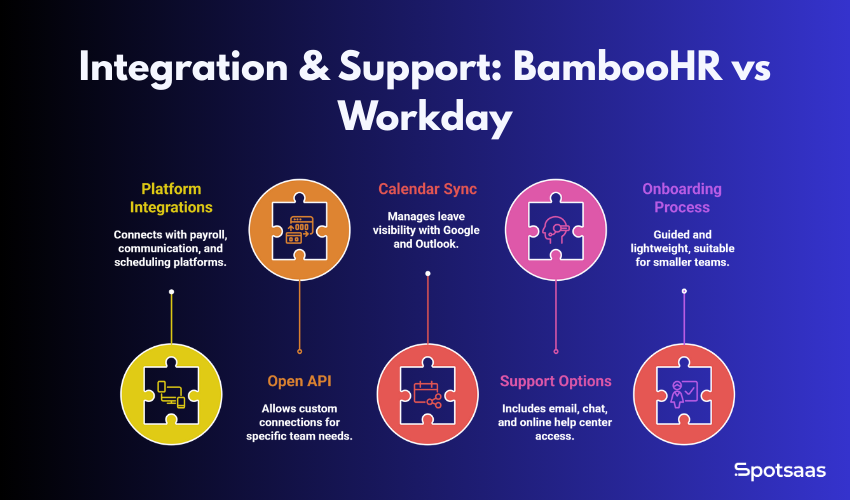
BambooHR Integrations and Support for Small Teams
BambooHR is designed to work seamlessly with popular tools that small and mid-sized teams already use. Its integrations are practical and easy to set up, especially for payroll, scheduling, and communication.
- Supports integrations with platforms like Gusto, Paychex, Slack, Microsoft Teams, and Google Workspace
- Offers an open API for teams that want to build custom connections
- Calendar sync with Google and Outlook helps manage leave visibility across the team
- Support includes email, chat, and access to an online help center
- Onboarding is guided but lightweight—ideal for teams without a dedicated IT department
BambooHR focuses on providing the essentials without overwhelming users, which makes it easier for smaller teams to maintain their workflows without added complexity.
Workday Enterprise Integrations and Long-Term Support
Workday is built to be the core system of record for HR and finance in large organizations. Its integrations are more comprehensive, often requiring IT coordination or partner involvement during setup.
- Connects with major ERP, payroll, benefits, finance, and workforce planning systems
- Offers secure APIs and connectors that align with enterprise-grade data architecture
- Built to support global operations with localization and compliance integration
- Includes guided implementation, live support, and a customer success team for long-term support
- Designed for companies with internal HR operations teams or external consulting support
Workday’s ecosystem is more complex, but it enables large businesses to manage everything from leave management to payroll to financials under one roof.
BambooHR vs Workday: Final Verdict — Which Absence Software Fits Your Team?
Both BambooHR and Workday are capable of providing absence management solutions, but they serve different business needs. The right choice depends on your company’s size, structure, and how much functionality you want beyond basic time-off tracking.
Choose BambooHR if:
- Your business is small or mid-sized with a lean HR team
- You want quick setup without complex onboarding
- Your team prefers a clean interface and mobile-friendly access
- You’re looking for transparent pricing and a free trial
- You only need essential absence management features
Choose Workday if:
- You operate a large company or manage global teams
- You need advanced workflows, policy automation, and compliance support
- You plan to connect HR with finance, payroll, and workforce planning
- Your business requires scalable solutions with long-term support
- You have the resources for a structured implementation
Choose BambooHR if:
- You run a small or mid-sized business with a lean HR team
- You need a quick-to-deploy solution that works out of the box
- Your team values a clean interface and mobile access
- You prefer transparent pricing with the option to try before you buy
- You don’t need deep customization or enterprise-level integrations
BambooHR focuses on simplicity and speed. It helps smaller teams get organized quickly without the learning curve that often comes with larger systems.
Choose Workday if:
- You manage a large or global workforce with layered HR workflows
- You require advanced leave policies, approvals, and compliance tracking
- Your HR strategy involves integrating payroll, finance, and talent tools
- You’re looking for a scalable platform that can evolve with your growth
- You have the resources for a structured implementation and training process
Workday is a powerful platform that goes beyond absence management. It’s ideal for businesses that view HR as a strategic function and need software that adapts to their scale and complexity.
Conclusion: BambooHR vs Workday Summary and Final Recommendations
Both BambooHR and Workday are capable platforms for absence management, but they are built with different types of organizations in mind. Each offers unique strengths, and the best choice depends on your team’s size, structure, and priorities.
BambooHR is an excellent fit for small to mid-sized businesses that need a reliable and easy-to-use system for tracking paid time off, sick leave, and other absences. With a simple interface, fast onboarding, and transparent pricing, it removes the friction often associated with HR software. It’s particularly helpful for companies without large HR departments or technical teams, giving managers and employees the ability to handle time-off workflows independently and efficiently.
Workday, on the other hand, is designed for larger enterprises that require advanced functionality across HR, payroll, finance, and compliance. Its absence management tools are part of a broader ecosystem that supports complex policies, multi-country operations, and detailed reporting. For organizations with layered approval structures, custom leave rules, and high scalability needs, Workday provides the infrastructure to manage everything in one place.
At the end of the day, it’s not about which software is better—it’s about which one fits your business model best:
- Choose BambooHR if your goal is speed, simplicity, and cost-effective implementation.
- Choose Workday if your organization demands a customizable, enterprise-grade solution with deep integrations and long-term scalability.
By understanding your team’s size, budget, and internal processes, you can make a confident decision that supports both your people and your operations.
FAQs: BambooHR vs Workday for Absence Management Software
Which platform is easier to set up—BambooHR or Workday?
BambooHR is quicker to implement and user-friendly from day one. Workday typically requires a longer setup process due to its enterprise-level features and customization options.
Can both platforms handle remote or hybrid teams?
Yes, both support remote and hybrid work environments. BambooHR is better suited for smaller remote teams needing fast access and mobile functionality, while Workday offers more advanced controls for distributed global teams.
Is pricing available publicly for both tools?
BambooHR offers starting prices (around $6.19/user/month) and allows for free trials. Workday does not list pricing publicly and requires a consultation to provide a custom quote.
Do both platforms integrate with payroll systems?
Yes. BambooHR integrates with popular payroll tools like Gusto and Paychex. Workday includes payroll as part of its broader enterprise suite and also connects with external systems.
Which tool is better for long-term scalability?
Workday is built for scale and is better suited for businesses planning to expand operations across regions or departments. BambooHR is ideal for smaller teams and can scale moderately as your needs grow.


